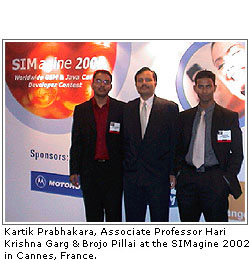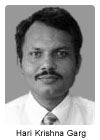Awards Gallery
Year 2002
- "Peer-2-Peer Advertising Platform" Bronze Medal Winner at SIMagine 2002, Cannes, France
- Best Theoretical Paper Award, WCICA, 2002, Shanghai, PR China

Dr. Hari Krishna Garg
"Peer-2-Peer Advertising Platform" Bronze Medal Winner at SIMagine 2002, Cannes, FranceA Team from
NUS, comprising Associate Professor Hari
Krishna Garg, students Kartik Prabhakara
and Brojo Pillai, won the Bronze medal
at SIMagine 2002.
"We are very excited to have been able
to showcase NUS at such a prestigious
global event. With support from the University
in entrepreneurial activites, and the
support and encouragement from our ECE
Department, we are confident that we will
go a long way." commented Associate Professor
Hari Krishna Garg, on receiving the award.
The team received a trophy and a cash
prize of Euro 10,000 (S$16310) in Cannes,
France. The prestigious worldwide JavaCard
application development competition is
organized by SchlumbergerSEMA, SUN Microsystems,
Motorola and numerous European mobile
operators.
The team from NUS came 1st among the University
entries and placed 3rd overall, competing
with nearly 200 entries from established
campanies, universities and independent
developers around the world.
The NUS team has formed a start-up company,
Purple Ace, and is looking into refining
and commercializing its product.
------------------------------------------------------
For further information, please contact:
Dr. Hari Krishna Garg
Email: eleghk@nus.edu.sg
Telephone: 6516 4542

Dr. Ge Shuzhi, Sam
Best Theoretical Paper Award, WCICA, 2002, Shanghai, PR ChinaPresented at the 4th World Congress on
Intelligent Control and Automation (WCICA),
Shanghai, China, 10-14 June 2002. Professor
Ge has made outstanding contributions
to the fundamental theory underpinning
intelligent control systems, and to practical
engineering methodologies. In great contrast
to the common empirical approaches, he
did extensive research in the field of
stable on-line adaptive neural control.
Stability of the closed-loop systems is
rigorously proven through Lyapunov stability
analysis.
Owing to fundamental contributions made,
stable adaptive neural control can be
constructed not only for typical benchmark
nonlinear systems such as affine nonlinear
systems, but also for more general unknown
complex systems that are beyond the scope
of traditional model-based control approaches,
such as nonaffine nonlinear systems, or
pure-feedback non-linear systems, with
mathematical rigor. It clearly demonstrates
that neural control is the next step of
development in adaptive control systems
and intelligent control, and beyond, as
conventional model-based control is of
little use for these complex problems.
Robust Adaptive Neural Control for a Class of Perturbed Strict Feedback Nonlinear Systems
Abstract >> This paper presents a robust adaptive
neural control design for a class of perturbed
strict feedback nonlinear system with
both completely unknown virtual control
coefficients and unknown nonlinearities.
The unknown nonlinearities comprise two
types of nonlinear functions: one naturally
satisfies the "triangularity condition"
and can be approximated by linearly parameterized
neural networks, while the other is assumed
to be partially known and consists of
parametric uncertainties and known "bounding
functions." With the utilization of iterative
Lyapunov design and neural networks, the
proposed design procedure expands the
class of nonlinear systems for which robust
adaptive control approaches have been
studied.
The design method does not require a priori
knowledge of the signs of the unknown
virtual control coefficients. Leakage
terms are incorporated into the adaptive
laws to prevent parameter drifts due to
the inherent neural-network approximation
errors. It is proved that the proposed
robust adaptive scheme can guarantee the
uniform ultimate boundedness of the closed-loop
system signals. The control performance
can be guaranteed by an appropriate choice
of the design parameters. Simulation studies
are included to illustrate the effectiveness
of the proposed approach.
IEEE Transactions on Neural Networks
Publication Date: Nov 2002
Volume: 13, Issue 6 on page(s): 1409-1419
------------------------------------------------------
For further information, please contact:
Dr. Ge Shuzhi, Sam
Email: elegesz@nus.edu.sg
Telephone: 6516 6821
|


